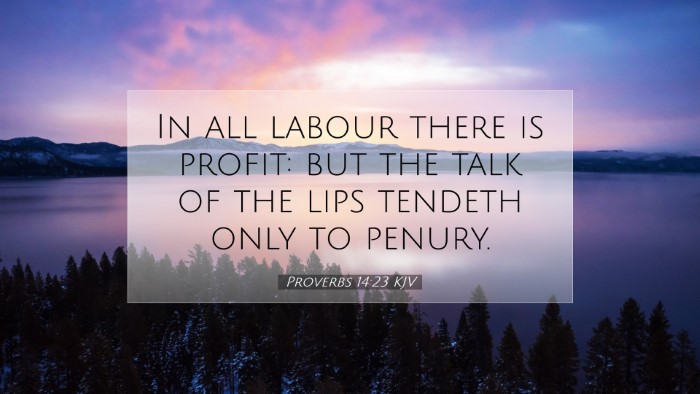Commentary on Proverbs 14:23
Proverbs 14:23: “In all labor there is profit: but the talk of the lips tendeth only to penury.”
This verse contrasts the value of hard work against the futility of mere talk. It is a profound insight into the nature of productive labor and the consequences of idleness.
Insights from Public Domain Commentaries
Matthew Henry's Commentary
Henry emphasizes that “in all labor there is profit,” suggesting that every effort made in genuine work yields some reward. The key to understanding labor's value lies in its productive nature; work that is performed earnestly leads to tangible benefits, both materially and spiritually.
He articulates an important principle: diligence in work is a mark of wisdom, while a propensity for idle chatter brings impoverishment. This alignment of action with purpose is fundamental to a successful life. Henry notes that this proverb advocates for a work ethic grounded in the fear of God and diligence.
Albert Barnes's Commentary
Barnes adds depth to the understanding of "profit" by suggesting that it may encompass not only financial gain but also the development of character and moral integrity. He argues that labor creates opportunities for growth and enhances one's abilities.
Moreover, Barnes points out that “the talk of the lips” represents empty words or the frivolous discussions that might arise without accompanying actions. In the biblical context, this could also hint at the kind of communication that distracts from meaningful pursuits and embodies decay rather than growth.
Adam Clarke's Commentary
Clarke reflects on the notion that labor is universally rewarded. He proposes that whether efforts are small or great, the principle holds that active engagement in one’s duties will yield fruits of labor, in contrast to the “talk of the lips,” which breeds nothing but despair and need.
He elaborates on the implications of idleness, noting it can lead to a cycle of poverty—both materially and spiritually. Idle speech often leads to misunderstanding and ultimately discouragement, whereas diligent work cultivates satisfaction and joy.
Practical Applications
- Encouragement for Hard Work: This verse serves as an exhortation for individuals, particularly in ministry and leadership, to engage earnestly in their tasks. The call to action is clear: put away idleness and commit to diligent labor.
- The Peril of Empty Words: Pastors and scholars should be cautious about becoming ensnared in verbose discussions resulting in no practical outcomes. It is essential to cultivate a practice of action-oriented teaching and preaching.
- Holistic View of Profit: Consider the various forms of profit—from spiritual insights gained through hard work to community service efforts that uplift others. This holistic understanding encourages surrounding oneself with work that furthers both personal aim and communal benefit.
- Building a Strong Work Ethic: Instilling a strong work ethic both in oneself and in church members or congregants aligns with the biblical principle of diligence resulting in profit.
Theological Reflections
The theological implications of Proverbs 14:23 extend into discussions about the nature of God’s provision. Understanding the relationship between labor and reward can lead to a deeper appreciation for God’s providence and faithfulness. In all labor, one can perceive a divine order and a call to reflect God’s industrious nature in our lives.
This proverb invites theologians to delve into the interplay between divine sovereignty and human responsibility—an essential balance wherein there is a recognition that while God supplies, he also calls us to act.
Conclusion
Proverbs 14:23 stands as a profound reminder to labor faithfully, recognizing the intrinsic value of work in God’s economy. As we reflect on the insights from Matthew Henry, Albert Barnes, and Adam Clarke, we glean a rich understanding of this verse that encourages action over talk, providing clarity in our Christian journey.


